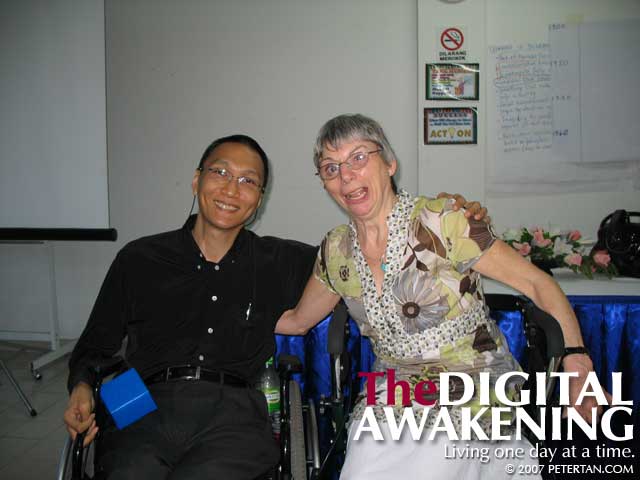Rights-Based Approach To Disability
Official speeches do not interest me normally. I have heard one too many to know that they are usually rehashed and rephrased versions of feel-good stories to suit the occasion. However, the speech by Cik Norani Mohd. Hashim, Pengarah Bahagian OKU of the Jabatan Kebajikan Masyarakat during the conclusion of a training that I attended at Bandar Baru Sentul recently perked my attention. The four keyphrases in her speech that grabbed my interest were rights-based approach, Independent Living, Disability Equality Training and Biwako Millenium Framework (BMF).
According to Cik Norani, the Jabatan Kebajikan Masyarakat Malaysia (JKMM) is moving away from the welfare-based approach to a rights-based one. This is encouraging news especially coming straight from the section director in a government department. A rights-based approach looks at the disabled person as a citizen with full rights equal to that of non-disabled citizens. They are involved in all decision-making processes that affect them. Every effort is made to ensure that they can participate in the activities of the society without hindrances. These include equal access to health care, education, employment, political, cultural and social activities that most people take for granted.
This approach recognises that each and every human being is unique and has varying degrees of ability. Irrespective of that, each is treated fairly by means of a social support system that takes into account the different needs and make up for it accordingly. Good examples are elevators that incorporate audio, visual and sensory devices to cater to the needs of wheelchair users, blind, deaf and non-disabled passengers. These include the appropriate positioning of the control panel for the convenience of wheelchair users, announcement and Braille buttons for the blind and visual display for the deaf.
The Biwako Millenium Framework (BMF) further reaffirms rights of disabled persons by outlining issues, targets and strategies in creating an inclusive barrier-free and rights-based society for people with disabilities in Asia and the Pacific. BMF is an inter-governmental resolution spearheaded by United Nations Economic and Social Commission for Asia and the Pacific (UNESCAP). According to the website, Asia and the Pacific have 400 million disabled persons, “by far the largest number of people with disabilities in the world. Most of them are poor, their concerns unknown and their rights overlooked.”
While I see the commitment by the JKMM, a department under the Kementerian Wanita, Keluarga dan Pembangunan Masyarakat, in implementing non-handicapping policies and striving to fulfil the issues raised in BMF , I have yet to see the same firm commitment from other relevant ministries and government agencies in supporting this initiative. In this sense, the JKMM and the ministry that it is under should work more proactively in garnering commitment from other ministries and see to it that objectives of the BMF are met within the timeframe agreed upon.
Going into 2007, the JKMM will be supporting Independent Living programmes run by NGOs with personnel trained in this field – an ongoing project initiated in 2005. At the same time, the second series of Disability Equality Training will be conducted for leaders in the disability movement so that they will be able to push the concept of equality for disabled persons to members of their respective organisations and the community. These all are organised with technical support and together with the Japan International Cooperation Agency (JICA) in Malaysia.
The road to attaining equality for disabled persons is still a long one lined with innumerable obstacles. The largest of those obstacles is attitudinal barrier. It is not easy to change deep-rooted perceptions and misconceptions about disability. Society can play its part and help hasten the process of mainstreaming disability by discarding patronizing and paternalistic ways of thinking and replacing them with a rights-based approach.

